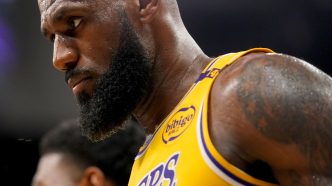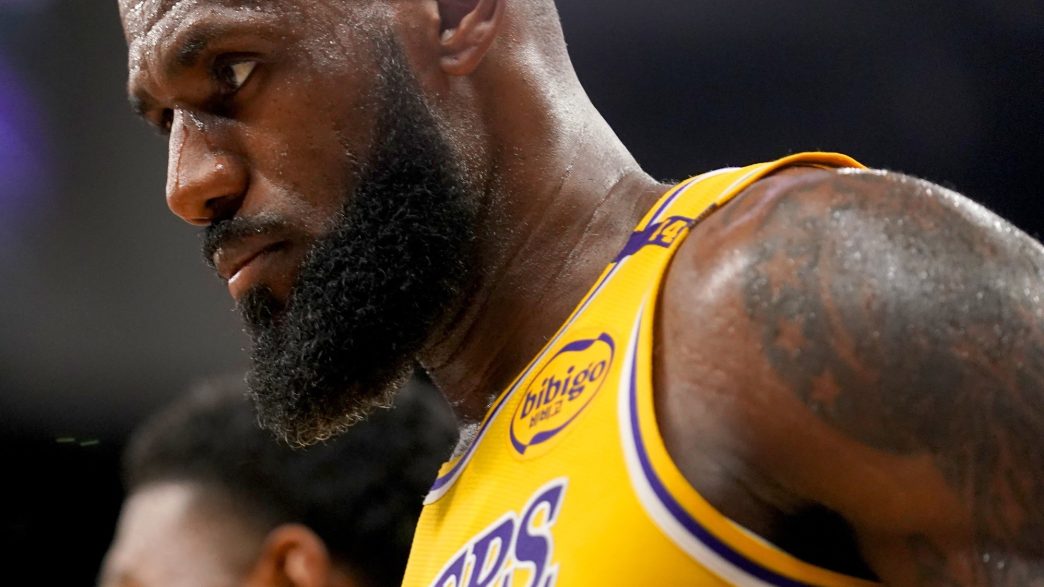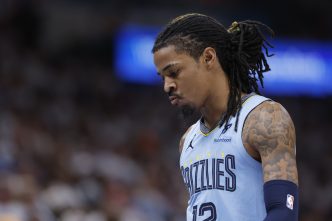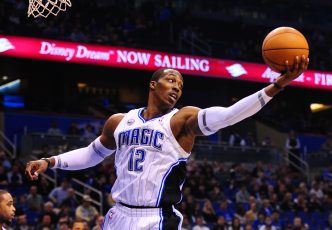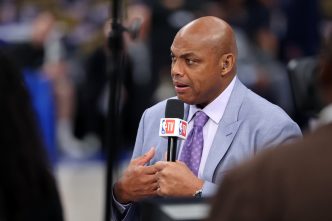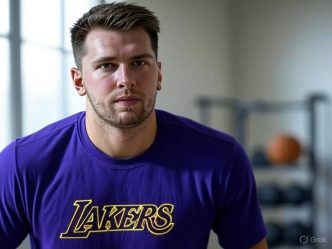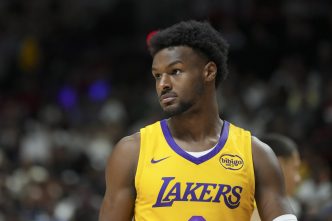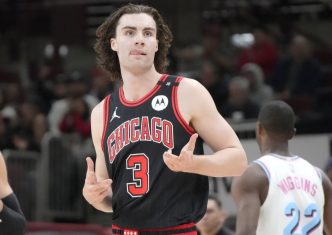Alright, NBA fans, let’s have a real conversation about LeBron James. The King has been a force for two decades, but after that 4-1 series loss to the Timberwolves, it’s time to face the truth: LeBron’s career is well past its prime, and the gap between him and Michael Jordan in the GOAT debate just got a whole lot wider. As someone who’s watched both legends dominate in their eras, I’m here to break down why Jordan’s legacy will always outshine LeBron’s—and why this latest playoff disappointment might be the final nail in the coffin for LeBron’s case.
Let’s start with the Timberwolves series. LeBron and the Lakers got dismantled, losing 4-1 to a hungry Minnesota squad led by Anthony Edwards. LeBron still put up numbers—26.4 points, 9.8 rebounds, and 8.2 assists per game—but those stats don’t tell the whole story. He looked gassed. The explosiveness we used to see, that freight-train drive to the rim, was missing. Instead, we saw a 39-year-old leaning on jumpers, struggling to keep up with Edwards’ relentless energy. Minnesota’s defense, anchored by Rudy Gobert and Jaden McDaniels, smothered the Lakers, and LeBron couldn’t find that extra gear to turn the tide. Game 5 was the dagger: LeBron went 9-for-22, coughing up six turnovers as the Wolves ran away with a 112-98 win. That’s not the LeBron who used to take over playoff series—it’s a sign that Father Time has finally caught up.
Now, let’s talk about what this means in the bigger picture. LeBron’s career has been incredible—four MVPs, four championships, and a scoring record that’ll stand for years. But this loss drops his Finals record to 4-6, and that’s a tough pill to swallow when you’re comparing him to Jordan. MJ went 6-0 in the Finals, never even letting a series go to seven games. That’s the kind of perfection under pressure that LeBron just hasn’t matched. Sure, LeBron’s longevity is unreal—he’s still a top player in year 21, something Jordan never got to test. But legacy isn’t just about how long you play; it’s about how often you win when it matters most. Jordan’s killer instinct, that ability to lock in and dominate every single Finals game, sets him apart. LeBron’s had his moments—like that 2016 comeback against the Warriors—but too often, he’s come up short in the clutch.
Let’s break down their playoff legacies a bit more. Jordan averaged 33.4 points per game in the postseason, with a 48.7% field goal percentage, and he did it against some of the toughest defenses in NBA history—think Bad Boy Pistons and Ewing’s Knicks. LeBron’s playoff numbers are stellar too—28.7 points, 9.7 rebounds, and 7.6 assists—but his efficiency dips to 46.1%, and he’s had more off nights in big moments. Remember 2011 against the Mavericks? LeBron averaged just 17.8 points in that Finals loss, shrinking when the Heat needed him most. Jordan never had a series like that. MJ was a perfect 24-0 in playoff series when his team had homecourt advantage. LeBron? He’s 14-5 in those spots, and that 4-1 loss to the Wolves just adds another blemish.
Then there’s the eye test. Jordan played with a ferocity that made you believe he’d rather die than lose. Every game felt like a personal mission—he’d lock down the other team’s best player, drop 40, and then stare down the crowd like he owned the place. LeBron’s more cerebral, a pass-first guy who elevates his teammates. That’s a beautiful style, but it doesn’t carry the same aura of invincibility. Against the Timberwolves, LeBron looked mortal, even frustrated, as Edwards and Karl-Anthony Towns took over. Jordan would’ve taken that challenge personally, hunted Edwards on both ends, and made sure the Bulls came out on top. LeBron’s game has evolved into a more passive, floor-general role, and while that’s still effective, it’s not the kind of dominance that wins GOAT debates.
Let’s not forget the intangibles. Jordan’s six championships came with six Finals MVPs—every time he got to the mountaintop, he was the best player on the floor. LeBron’s four rings come with four Finals MVPs too, but those six losses—including series where he wasn’t the best player, like 2014 against the Spurs—hurt his case. And defensively, there’s no comparison. Jordan was a nine-time All-Defensive First Team selection and won Defensive Player of the Year in 1988. LeBron’s got five All-Defensive nods, but he’s never been the lockdown defender MJ was. Against Minnesota, LeBron couldn’t slow down Edwards, who dropped 31.6 points per game in the series. Jordan would’ve made that kid’s night a living nightmare.
This Timberwolves loss feels like a turning point. LeBron’s still a great player, but he’s not the guy who can carry a team to a title anymore. The Lakers need more from Anthony Davis and their supporting cast, but LeBron’s legacy is tied to winning as the man. Jordan never had a late-career stumble like this—his last act with the Bulls was a game-winning jumper to seal a three-peat in ‘98. LeBron’s last act might be this 4-1 beatdown, a reminder that even the King can’t rule forever. For fans who’ve watched both careers, this series just solidifies what many already believed: Jordan’s legacy, with its flawless Finals record and unmatched intensity, will always be the gold standard. LeBron’s had an incredible run, but in the GOAT debate, MJ’s still the one we’re telling stories about years from now.

